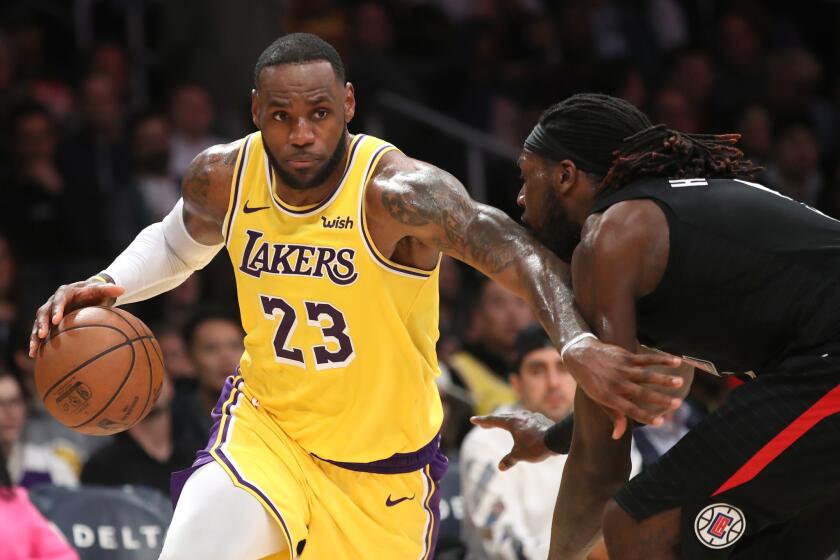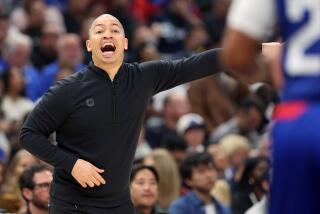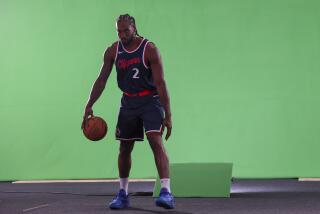Doc Rivers’ Magic lessons taught him how to deal with superstar players
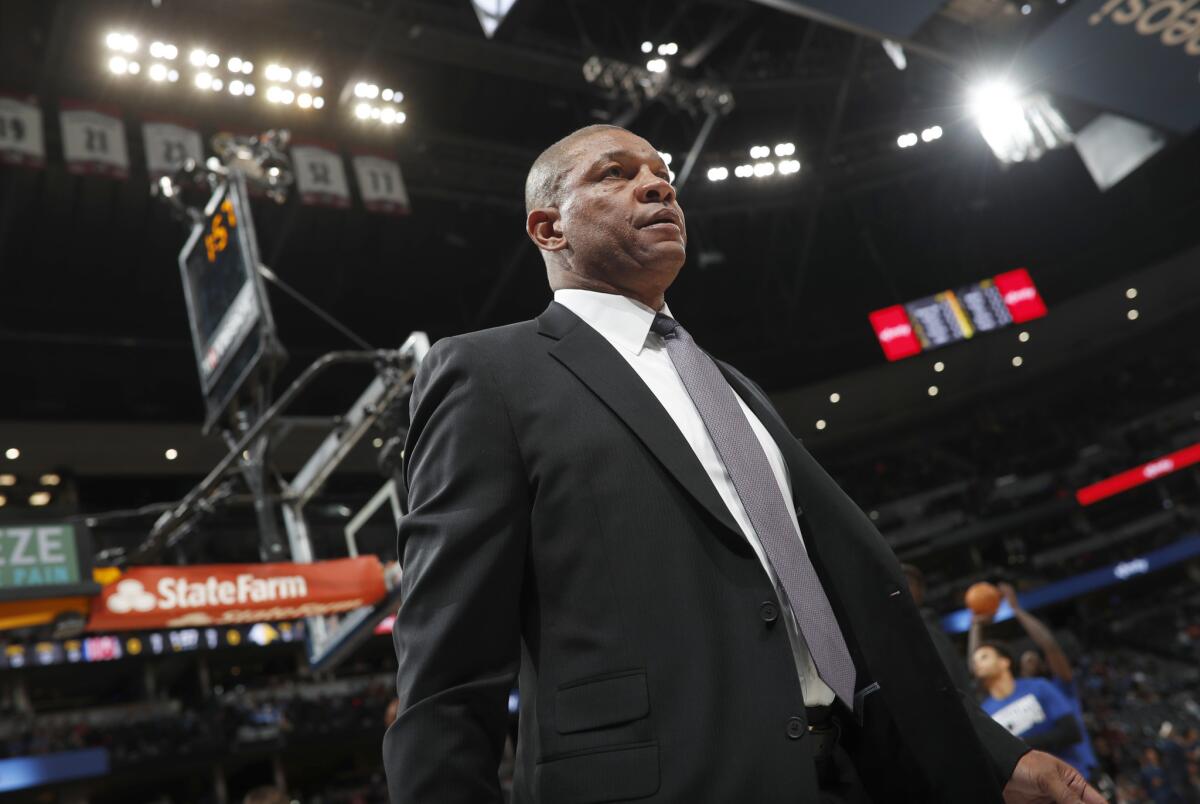
- Share via
In the living room of Doc Rivers’ Malibu home, Clippers representatives meeting with Kawhi Leonard presented the star free agent with a list of peers he might be interested in playing alongside.
Lawrence Frank, the team’s president of basketball operations, recently recalled that Leonard pointed to the name of Paul George.
“That’s the guy,” Leonard said.
By week’s end, George was acquired in a trade, Leonard agreed to sign, and a franchise that had struggled to attract top players since its move to Los Angeles 35 years ago had entered uncharted territory.
However, the host of Leonard’s free agency meeting felt he was back on familiar ground.
Nineteen years after Rivers, as the Magic’s coach and key pitchman, helped Orlando land Grant Hill and Tracy McGrady, he put to use the lessons learned from his first experience helping assemble a superteam during the Clippers’ pursuit of Leonard and George.
“I can draw upon Orlando,” Rivers said, “because we had so much success doing it.”
It was not the first time the coach said he recognized striking parallels between those Magic and these Clippers — experiences he hopes will diverge in one critical way.
The Clippers and Lakers will kick off a brand new and exciting version of their rivalry, as they open the season Oct. 22 at Staples Center.
Both began their rebuilds through a painful trade of a popular, homegrown star — Penny Hardaway in Orlando, Blake Griffin in L.A. Both refused to tank, defying low expectations behind a gritty style and a roster devoid of an All-Star — teams Rivers called the “Heart and Hustle” Magic and “Blacktop” Clippers. Both closed the cycle by adding some of the NBA’s most talented players, after their front offices went to great lengths to get superstars.
“Lawrence Frank did more research than any human being is possible to do,” Rivers said. “And I thought [former Orlando general manager] John Gabriel did the same thing. That’s why we were successful in Orlando getting Tracy and Grant, and that’s why we‘ve been successful today.”
In Orlando, Rivers pushed the Magic to stay competitive rather than bottom out, believing top players wanted to join competitive teams they could win with immediately rather than rebuilding from scratch. It’s also why each of the last two seasons, Rivers vowed the Clippers would remain in postseason contention following trades of the team’s top scorer.
“You could just see their connection on the court,” George said of the Clippers’ past season, in which they won 48 games — 15 more than some Vegas oddsmakers expected — before earning a playoff berth. “Everybody pulling for one another, everybody elevated their games to be part of that camaraderie. That’s what made it such an attractive spot.”
In Orlando, Rivers also learned that free agency presentations are not one-size-fits-all.
With Leonard, the Clippers’ research indicated he sought a substantive, basketball-focused conversation.
“All the other stuff that people think matters in the recruitment, I don’t think Kawhi wanted to talk about that, and so I didn’t,” Rivers said. “I talked about winning, and basketball.
“Kawhi is a serious man and I think you felt that with him. I think he felt the seriousness of me and how serious I am about winning and how serious he is about winning and he felt good about that match.”
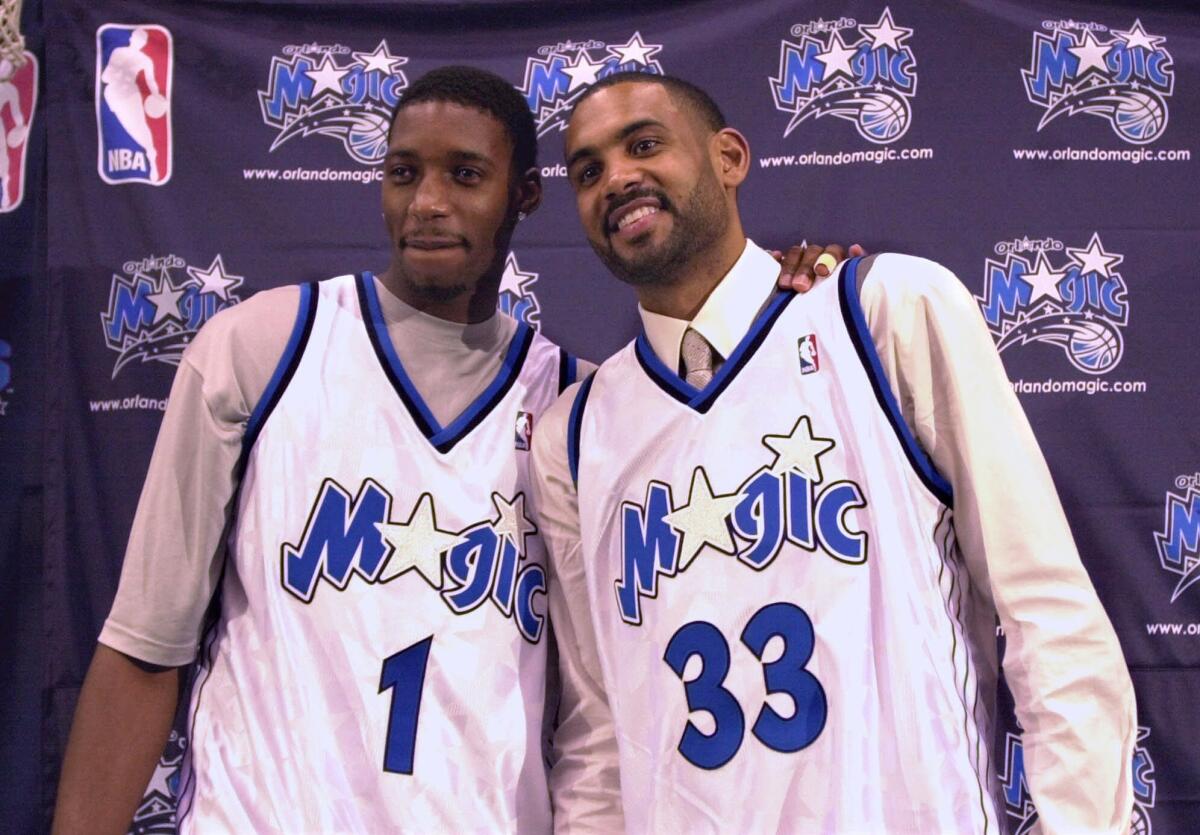
The discussion in Rivers’ living room was a far different scene than the grand tour the Magic took their targets, including Tim Duncan, on in 2000. At Isleworth, an exclusive, gated Orlando suburb, the free agents “just happened to run into Ken Griffey Jr. walking his dog,” Gabriel said. Then everyone piled into golf carts.
“We capped it off saying, ‘Hey look, there’s a guy teeing off on the fourth hole.’ We drove up and there’s Tiger.”
Tiger Woods hit a drive within inches to the pin before chatting with the free agents, Gabriel recalled. Later, when the players were given the run of Disney World after hours, they saw a ball at Epcot that was lit to read: “Grant Us Tim.”
“We did a pretty decent job of painting Orlando as a field of dreams,” Gabriel said. “I got a call from Lon Babby [Hill and Duncan’s agent] saying, ‘You did it. The visit with Duncan, with Grant and T-Mac, was just sort of a courtesy at the beginning, but [Duncan] wants to come.’”
Duncan eventually re-signed with San Antonio, but Rivers says an oft-told anecdote that Duncan was turned off by being told his family could not fly on the Magic’s plane is not true. A bigger factor, he believes, were the relationships Duncan shared with center David Robinson, who cut short a vacation to Hawaii to see Duncan, and the coach he’d won the 1999 title with, Gregg Popovich.
Gabriel said he was never worried by a pitch to entrust a chunk of the stars’ primes to a coach with one year of experience. He believed Rivers’ 13-year playing career carried the weight his coaching credentials lacked.
“He was in so many ways way ahead of the curve in what you would consider someone to be in a rookie coach,” Gabriel said. “I saw him and he saw himself as an asset to getting this done, particularly in his ability to connect with players, having been one.”
That connection proved influential with Leonard, as well. Though he already had two NBA titles, Leonard wanted to know how his time with the Clippers could be maximized. Rivers, who won the 2008 title in Boston while shepherding another so-called superteam of Ray Allen, Paul Pierce and Kevin Garnett, showed how.
“With Doc being a championship head coach, that’s something I wanted,” Leonard said.
Said Rivers: “I guess the difference this time is I knew the league more. I knew me more. I had a body of work. The time with Tim and Grant and Tracy, I’d coached one year. I really didn’t have a body of work, so I think my body of work played in my favor this time.”
That experience underscored perhaps the most important lesson of all. If merely assembling a roster with such talent is supremely difficult, so too is fulfilling its championship-level promise.
Boston represents the best-case scenario: Eleven months after acquiring Garnett, the Celtics won a title.
In contrast, injuries, the rise of Golden State and, at times, infighting kept Rivers’ Lob City-era Clippers from reaching their potential. Orlando had three first-round playoff exits and a 21-win season to show for Hill and McGrady’s four seasons together. A recurring ankle injury forced Hill to effectively miss two of those seasons. Rivers was fired during the pair’s fourth and final year together.
“The experience in Orlando made me appreciate the Boston thing more,” Rivers said. “It taught me how hard it is to frickin’ win. It’s hard to win. You need a lot of things to go your way.”
So far with the Clippers, as in Orlando, two things already have.
More to Read
Go beyond the scoreboard
Get the latest on L.A.'s teams in the daily Sports Report newsletter.
You may occasionally receive promotional content from the Los Angeles Times.

